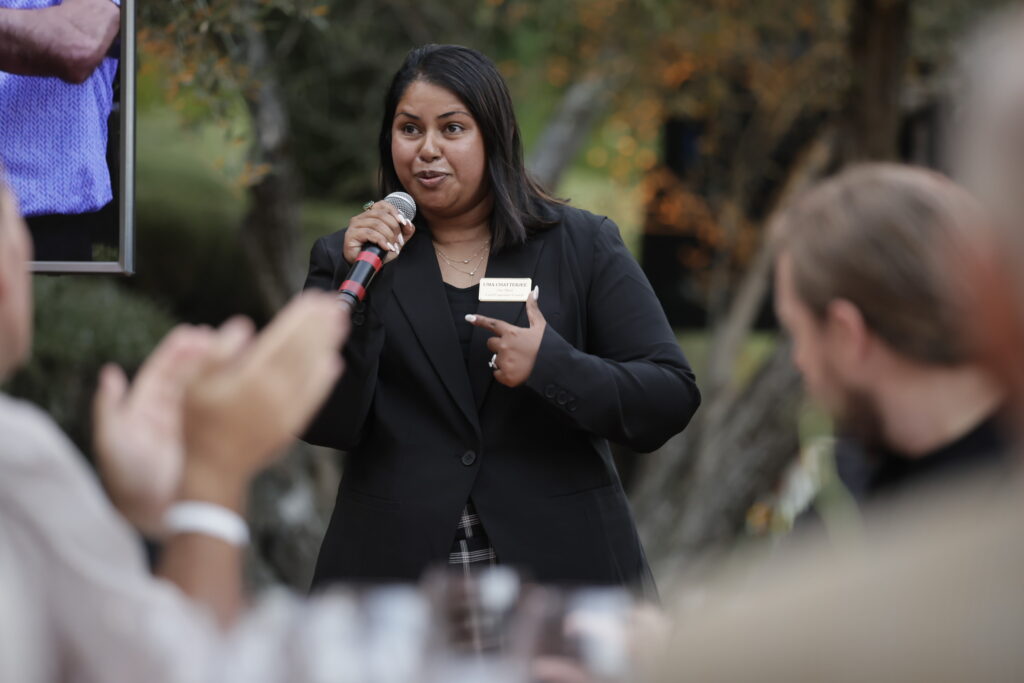The Words That Almost Killed Me—and the Ones That Saved Me: How Language Shapes the Reality of Mental Illness
by Uma Chatterjee, One Mind Lived Experience Council Member

I’ve spent most of my life learning that language can save lives–or destroy them.
The words we use to describe mental illness aren’t neutral. They don’t just reflect how we think about these conditions; they create the systems that decide who gets understood, who gets treated, and who gets left behind.
For me, that difference wasn’t theoretical. It nearly cost me my life.
When Words Miss the Mark
I was born with severe obsessive-compulsive disorder (OCD)–but I didn’t know that for 25 years. What I did know was that my brain felt like a broken fire alarm: constantly blaring danger when there was none, trapping me in rituals I couldn’t explain. I said prayers 39 times to keep my parents alive. I reread conversations for hours to “prove” I wasn’t lying. I sat in the dark terrified that turning on the lights would bankrupt my family.
From age 12 to 25, I saw 22 clinicians–psychiatrists, psychologists, social workers, counselors– from outpatient settings to hospitals. None recognized my debilitation as OCD. I was told I had major depressive disorder, generalized anxiety disorder, panic disorder. While I do meet diagnostic criteria for these conditions, they weren’t the primary diagnosis that governed everything else.
And while all this was happening, I kept hearing OCD tossed around as a joke. “I’m so OCD about cleaning.” “She’s a little OCD about color-coding her closet.” I even said it myself about my mom when she told me to clean my room.
That’s how deep misunderstanding runs–it shaped how I and every professional tasked with treating me all misnamed the very disorder that almost killed me.
When Language Becomes a Barrier
We as a society have made it common practice to inaccurately throw diagnostic words around constantly:
“I’m so OCD.”
“He’s being bipolar.”
“I’m addicted to this album.”
“That show finale gave me a little PTSD.”
But none of that makes sense. You can’t be a disorder. You can’t be or have “a little” or “so” anything that requires diagnostic criteria to meet. Disorders are defined by whether symptoms are present and impairing your life. Saying “I’m so OCD” is as nonsensical as saying “I’m a little cancer.”
It’s not just inaccurate; it’s dangerous. When we use diagnostic labels as adjectives, quirks, or personality traits, we distort their meaning until they no longer point to real, debilitating conditions. And when meaning disappears, so does life-saving treatment, training, and funding.
OCD, while probably the most casually and consistently misused diagnosis out there, isn’t the only casualty.
We say we’re addicted to coffee or to a TV show, trivializing what addiction and substance-use disorders actually are–medical conditions that alter brain function and can devastate lives.
We misuse bipolar to describe weather patterns or mood swings, erasing the complexity of a disorder defined by distinct mood episodes–not momentary shifts.
We use depressed to mean sad or disappointed, minimizing an illness that can immobilize and kill.
We use psychotic to mean “unhinged,” trivializing experiences of psychosis that can be terrifying, isolating, and life-threatening.
We even romanticize intrusive thoughts as impulsive, quirky desires–“my intrusive thought told me to dye my hair”–when in reality, intrusive thoughts in OCD are the opposite: unwanted, distressing, and often violent or taboo.
Every misuse chips away at understanding. And that misunderstanding has consequences far beyond vocabulary.
From Misunderstanding to Misdiagnosis
Because language defines how we see illness, it also determines who gets care. For OCD alone, research shows up to 85 percent of clinicians misdiagnose it (source), and it takes an average of 14 to 17 years before receiving proper treatment (source). I squarely exemplify these statistics, being misdiagnosed by 22 different clinicians and losing 25 years of my life.
In that time, people lose jobs, education, relationships, entire decades of living. And far too often, they lose their lives. People with OCD are ten times more likely to die by suicide than the general population (source)–largely because of the disorder’s severity, the shame attached to its taboo themes, and the lack of accurate understanding or access to evidence-based treatments.
In my own case, the weight of misdiagnosis almost killed me. I attempted suicide multiple times because I truly believed I was an evil person. My intrusive thoughts–violent, taboo, horrifying–felt like proof that I was dangerous and undeserving of life. No one had explained that intrusive thoughts are ego-dystonic: unwanted, inconsistent with who you are. Instead, every clinician treated them as symptoms of anxiety or trauma or character. So I internalized them as truth.
When you spend your entire life convinced by your own mind that you are a monster, it becomes nearly impossible to want to stay alive.
And it doesn’t stop there. Misunderstanding OCD’s intrusive thoughts has led parents to lose custody of their children when they disclose them, to be reported to Child Protective Services, even arrested (source). People have been institutionalized or incarcerated (source) for describing the thoughts that torment them precisely because our culture doesn’t grasp the difference between ego-dystonic and ego-syntonic experiences–between a fear of harming someone and an intent to do so.
All of that happens because of language.
The Domino Effect of Wrong Words
When the public, media, and even professionals misuse diagnostic terms, the damage cascades.
- Clinicians miss diagnoses because they were never properly trained to recognize the disorder beyond its stereotypes.
- Researchers struggle to secure funding because the conditions they study are seen as trivial or self-inflicted.
- Insurance companies undervalue mental-health treatment because “mental” is perceived as optional or less medical.
- Policymakers write laws and allocate resources based on those same misconceptions, reinforcing inequities in care and access.
- Patients blame themselves for not getting better under the wrong therapies–therapies that often make them worse.
That’s the domino effect of language: a single misunderstanding at the cultural level can ripple through every tier of the system.
The Problem With “Mental”
Even the term mental illness reinforces that divide.
Calling these conditions “mental” has convinced generations that they’re not physical. It suggests they exist only in thought or will, separate from the body–when in reality, they are disorders of a physical organ: the brain.
The brain is as biological as the heart or lungs, and when it malfunctions, the results are just as measurable and deadly. But because we call them “mental,” we treat them as character problems instead of medical ones.
When I was diagnosed with cancer, people rallied around me with sympathy and legitimacy. When I talked about my equally life-threatening serious mental illnesses such as OCD, PTSD, and treatment-resistant depression, people instead questioned my willpower and character. Yet both illnesses come from the same body, the same biology.
That linguistic split fuels a systemic one. Insurance reimburses less for psychiatric care. Research funding lags far behind. Clinicians are undertrained and underpaid. And society still debates whether people with mental illness deserve the same compassion as those with “physical” diseases.
We keep wondering why stigma persists. The answer is embedded in the very words we use.
The Price of Misunderstanding
Because we separate “mental” from “physical,” brain-based illnesses remain catastrophically underfunded. Psychiatric research receives a fraction of the investment given to other medical fields, despite mental illness being a leading cause of disability and early death (source), stalling progress and hope for those suffering–not for lack of science, but for lack of priority.
This post comes out during OCD Awareness Week, which is remarkably fitting. Awareness weeks exist because understanding is still so far from where it needs to be. OCD Awareness Week exists to correct one of the most persistent linguistic and cultural misrepresentations in mental health. When we use language correctly, we start to save lives. The same principle applies to every awareness week–bipolar disorder, schizophrenia, PTSD, eating disorders, addiction. Awareness that doesn’t reflect reality isn’t awareness; it’s noise.
Changing the Conversation: How One Mind Is Redefining Language Through Lived Experience
At One Mind, accurate language–grounded in lived experience–is driving real change. Through the Lived Experience Council (OMLEC) and Community Advisory Network (OMCAN), people with lived experience–all of whom are also neuroscientists, clinicians, educators, policymakers, industry executives, and communications professionals themselves–work both within and alongside these fields to name conditions accurately, dismantle long-standing stereotypes, and inform flagship One Mind initiatives including the Rising Star Academy, the Accelerator, and One Mind at Work.
I’ve seen how powerful language can be when it’s used to tell the truth. At the 2025 One Mind Music Festival dinner, I shared my story as a survivor, knowing that most people in the room had never heard OCD described as it truly is. By reclaiming the language around it–naming the illness for what it is rather than what culture imagines it to be–I watched awareness transform into action: One Mind raised over one million dollars following that speech, and more than four million across the weekend, fueling research and advocacy rooted in truth and empathy.
Another example came from Dr. Moses Lee, a 2025 One Mind Rising Star Awardee, whose talk on OCD captured the same spirit of truth-telling. Through clear, compassionate language, he brought listeners into the lived experience of a patient’s daily struggle–educating on what OCD actually is, reframing it beyond cultural shorthand, and centering common humanity to facilitate true understanding. His talk, like many that weekend, showed how using words precisely and compassionately can dismantle stigma and deepen collective understanding.
This is what happens when language becomes a bridge instead of a barrier–when we speak about mental illness with accuracy, compassion, and courage. At One Mind, that shift isn’t theoretical; it’s measurable, cultural, and ongoing.
From Awareness to Action
So where do we go from here? We start where change always starts–with words.
- Name conditions accurately. When distress becomes debilitating, name the condition accurately–obsessive-compulsive disorder, bipolar disorder, addiction. But don’t use those names to describe quirks, preferences, or personality traits. Being tidy isn’t OCD. Mood swings aren’t bipolar disorder. Loving coffee isn’t addiction.
- Correct misuses in real time. Gently, firmly. At dinner tables, in classrooms, in media scripts, in clinics. Small corrections create cultural shifts.
- Hold institutions accountable. Expect journalists, clinicians, and policymakers to use language that reflects science and lived experience, not stereotypes.
- Amplify voices of lived experience. Center people who’ve been misrepresented, misdiagnosed, or misunderstood–and let their stories redefine public understanding.
Every time someone uses the right words:
A diagnosis becomes possible.
A treatment becomes accessible.
A parent keeps their child.
A person chooses to stay alive.
That’s what language can do. That’s what awareness is supposed to mean.
And that’s why, this OCD Awareness Week and every week after, I’ll keep saying it: Words matter–because they’re often the first medicine we have.
